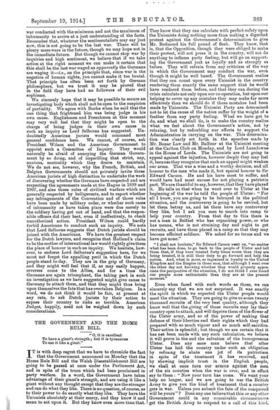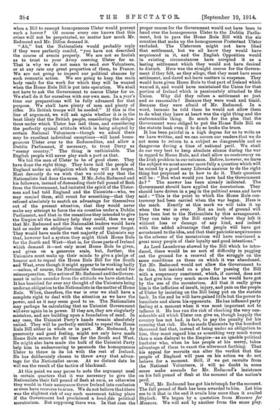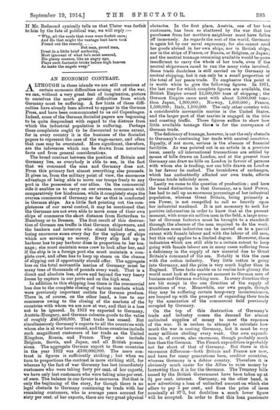THE GOVERNMENT AND THE HOME RULE BILL.
" 0, it is excellent To have a giant's strength ; but it is tyrannous To use it like a giant."
IT is with deep regret that we have to chronicle the fact that the Government announced on Monday that the Home Rule Bill and the Welsh Disestablishment Bill are going to be passed at once under the Parliament Act, and in spite of the truce which had been proclaimed in party warfare. In a word, the Government have taken advantage of their giant's strength, and are using it like a giant without any thought except that they are the stronger and can do what they like. There is no question, of course, as to their power to do exactly what they like. They have the Unionists absolutely at their mercy, and they know it and mean to act upon it. But they know even more than that. They know that they can calculate with perfect safety upon the Unionists doing nothing more than making a dignified protest against the Government's determination to give Mr. Redmond his full pound of flesh. They know, that is, that the Opposition, though they were obliged to make their protest, will not press it in the country, will not do anything to inflame party feeling, but will go on support. ing the Government just as loyally and as strongly as before. They will refrain from any criticism of the way in which the Government may conduct the war, even though it might be well based. The Government realize that they can count upon every Unionist in the country rendering them exactly the same support that he would have rendered them before, and that they can during the crisis calculate not only upon our co-operation, but upon our helping to cover up any mistakes they may make far more effectively than we should do if those mistakes had been made by Unionists. The Unionist Party are determined not to let the cause of the nation suffer by the weight of a feather from any party feeling. What we have got to do, and what we shall do, is to make the country realize what we feel about the Government's action, not by relaxing, but by redoubling our efforts to support the Administration in carrying on the war. This determina- tion was clearly set forth in the speeches made by Mr. Bonar Law and Mr. Balfour at the Unionist meeting at the Canton Club on Monday, and by Lord Lansdowne in the House of Lords. The Unionists are not going to appeal against the injustice, however deeply they may feel it, because they recognize that such an appeal might weaken our arms. That was a wise and a worthy decision, and all honour to the men who made it, but special honour to Sir Edward Carson. He and his have most to suffer, and would have had most excuse for not playing a patriotic part. We are thankful to say, however, that they have played it. He tells us that when he went over to Ulster at the beginning of the war he told the people of Ulster : " For all I know, you are going to be betrayed in the political situation, and the controversy is going to be revived, but let them betray us, and let them have any controversy they like, but I ask you men to march into camp to help your country. From that day to this there is not a man in Belfast who has organizing power, or who has means, who is not straining day and night to get recruits, and have them placed in a camp so that they may become efficient soldiers. We asked for no terms and we have got none."
"I shall not hesitate," Sir Edward Carson went on, "no matter what has been done, to go back to the people of Ulster and tell them that, if they were treated forty times worse than they are being treated, it is still their duty to go forward and help the nation. And, what is more, so ingrained is loyalty to the United Kingdom and the Empire in these men, that although I went over the other day not knowing whether they would properly appre- ciate the perspective of the situation, I do not think I ever found our people more enthusiastic than they are at the present moment."
Even when faced with such words as these, we can sincerely say that we are not surprised. It was exactly the spirit in which we expected the Ulster people would meet the situation. They are going to give us some twenty thousand recruits of the very best quality, although they know well that the giving of these recruits may lay their country open to attack, and will deprive them of the flower of the Ulster army, and so of the power of making that defence of their liberties and their rights which they had prepared with so much vigour and so much self-sacrifice. Their action is splendid ; but though we are certain that it has net been made with any such calculation, we believe it will prove in the end the salvation of the homogeneous Ulster. Does any sane man believe that after Ulster has laid the country under such an obligation by refusing to abate one jot of its patriotism in spite of the treatment it has received, and by showing implicit trust in the English people, we shall at once turn our armies against the men of the six counties when the war is over, and in effect say to them : " Now your turn has come. We want your help no longer, and we are going to use the British Army to give you the kind of treatment that a country gets in war. Unless you submit the fate of the conquered will be yours " ? Does any one believe that this or any other Government could in any conceivable circumstances get the British Army to respond to a call of this kind, when a Bill to exempt homogeneous Ulster would prevent such a horror ? Of course every one knows that this crime will not be perpetrated, no matter how much Mr. Redmond and Mr. Dillon demand it.
" Ali," but the Nationalists would probably reply if they were perfectly candid, "you have not described the course of events properly. We are not so foolish as to trust to your Army coercing Ulster for us. That is why we do not mean to send our Volunteers, or at any rate any great proportion of them, to France. We are not going to imperil our political chances by such romantic action. We are going to keep the main body ready for the work for which they will be wanted when the Home Rule Bill is put into operation. We shall not have to ask the Government to coerce Ulster for us. We shall do it for ourselves with our own men. In a year's time our preparations will be fully advanced for that purpose. We shall have plenty of men and plenty of rifles. No British troops will be needed." If this is the line of argument, we will ask again whether it is in the least likely that the British people, considering the obliga- tions under which Ulster has laid them, and considering the perfectly cynical attitude which is being adopted by certain National Volunteers—though we admit there may be excellent individual exceptions—will hand homo- geneous Ulster over to the Redmondites, and allow a Dublin Parliament, if necessary, to treat Derry as "enemy country." The thing is unthinkable. The English people will never play such a part as that.
We bid the men of Ulster to be of good cheer. They have done the right thing. They have laid the people of England under an obligation which they will not forget. Most devoutly do we wish that we could say that the Nationalists had done the same. If Mr. John Redmond and his followers, instead of demanding their full pound of flesh from the Government, had imitated the spirit of the Ulster- men and had told England and the Unionists—who, we may remind them, still count for something—that they refused absolutely to snatch an advantage for themselves out of the present situation, that they would never make any attempt to force the six counties under a Dublin Parliament, and that in the meantime they intended to give the Empire all the military help they could, then we say that Mr. Redmond and the Nationalist leaders would have laid us under an obligation that we could never forget. They would have made the vast majority of Unionists say that, however bad a system they might think Home Rule for the South and West—that is, for those parts of Ireland which demand it—not only must Home Rule be given, and given on a generous scale, but, further, the Unionists must make up their minds to give a pledge of honour not to repeal the Home Rule Bill for the South and West, even though it might appear to be working badly —unless, of course, the Nationalists themselves asked for reincorporation. The action of Mr. Redmond and the Govern- ment is miles asunder from the attitude we have sketched. It has banished for ever any thought of the Unionists being under an obligation to the Nationalists in the matter of Home Rule. When, therefore, the war is over we shall have a complete right to deal with the situation as we have the power, and as it may seem good to us. The Nationalists may perhaps be calculating that no Unionist Government will ever again be in power. If they are, they are singularly mistaken, and are building upon a foundation of sand. In any case, the Unionist Party's hands remain absolutely untied. They will be perfectly entitled to repeal the Home Rule Bill either in whole or in part. Mr. Redmond, by generosity and good feeling, might not only have made Home Rule secure for all time for the South and West. He might also have made the bulk of the Unionist Party help him in endeavouring to persuade the homogeneous Ulster to throw in its lot with the rest of Ireland. He has deliberately chosen to throw away that advan- tage for the Nationalist cause. At no distant date be will see the result of the tactics of blackmail.
At this point we may pause to note the argument used in certain quarters that it was necessary to give the Nationalists their full pound of flesh at once, as otherwise they would in their annoyance throw Ireland into confusion or even have recourse to arms. We do not believe that there was the slightest risk of any such movement taking place if the Government had proclaimed a bona'-fide political moratorium. But supposing there was. In that case the proper course for the Government would not have been to hand over the homogeneous Ulster to the Dublin Parlia- ment, but to pass the Home Rule Bill with the six counties that make up the homogeneous Protestant Ulster excluded. The Ulstermen might not have liked that settlement, but we all know they would have acquiesced in it, and the English Opposition would in existing circumstances have accepted it as a lasting settlement which they would not have desired to disturb. Here was the straight course for the Govern- ment if they felt, as they allege, that they must have some settlement, and dared not leave matters iu suspense. They would have given Home Rule to that part of Ireland which wanted it, and would have maintained the Union for that portion of Ireland which is passionately attached to the Union. Why did they refuse a settlement so just and so reasonable ? Because they were weak and timid. Because they were afraid of Mr. Redmond. In a word, because he told them he would not allow them to do what they knew at heart was the right thing and the statesmanlike thing. So much for the plea that the Government were obliged to put the Home Rule Bill on the statute book even if to do so broke the truce.
It has been painful in a high degree for us to write as we have written, and we can assure our readers that we do not mean to return to a subject so disagreeable and so dangerous during a time of national peril. We shall do our very best to keep absolute silence during the war in regard to Home Rule, and shall allow no controversy on the Irish problem in our columns. Before, however, we leave the subject we must answer more fully a question which will be raised by a good many Liberals anxious to do the right thing but perplexed as to how to do it. Their question will be : "But what would you have had the Government do ? " The answer has been already indicated. The Government should have applied the moratorium. They should have driven in a peg in the political arena and have said : " This is the point to which the Home Rule con- troversy had been carried when the war began. Here is the mark. Exactly at this mark we will take it up when the war is over. Not an inch of ground will have been lost to the Nationalists by this arrangement. They can take up the Bill exactly where they left it without loss or damage of any kind, and indeed with the added advantage that people will have got accustomed to the idea, and that their patriotic acquiescence in the scheme of the moratorium will have convinced a great many people of their loyalty and good intentions."
As Lord Lansdowne showed by the Bill which he intro- duced, there would be no sort of difficulty in pegging out the ground for a renewal of the struggle on the same conditions as those on which it was abandoned. Yet Mr. Redmond would not allow the Government to do this, but insisted on a plan for passing the Bill with a suspensory enactment, which, if carried, does not in fact give him very much more than he would have got by the use of the moratorium. All that it really gives him is the infliction of insult, injury, and pain on the people of Ulster by insisting on the Bill being put on the statute book. In the end he will have gained little but the power to humiliate and alarm his opponents. He has inflamed party feeling at a moment when it was most important not to inflame it. He has run the risk of checking the very con- siderable aid which Ulster can give us, though happily the country has not bad, in fact, to pay the penalty for his running that risk. He has made Unionists by the hundred thousand feel that, instead of being under an obligation to him, they must regard him as something very much worse than a man disloyal to the Empire—as an ignoble political huckster who, when he has people at his mercy, takes advantage of them to exact the uttermost farthing. That his appeal for recruits can alter the verdict that the people of England will pass on his action we do net believe for a moment. Still, if we get recruits from the National Volunteers, it will no doubt in some sense make amends for Mr. Redmond's insistence on his full pound of flesh at the moment of the nation's peril. Well, Mr. Redmond has got his triumph for the moment. The full pound of flesh has been awarded to him. Let him see to it that in the end it avails him more than it availed Shylock. We began by a quotation from Measure for Measure. We will end by another from the same play. If Mr. Redmond cynically tells us that Ulster was forfeit to him by the fate of political war, we will reply
Why, all the souls that were were forfeit once; And He that might the vantage best have took Found out the remedy. . . . But man, proud man, Drest in a little brief authority, Most ignorant of what he's most assured, His glassy essence, like an angry ape, Plays such fantastic tricks before high heaven As make the angels weep."




































 Previous page
Previous page